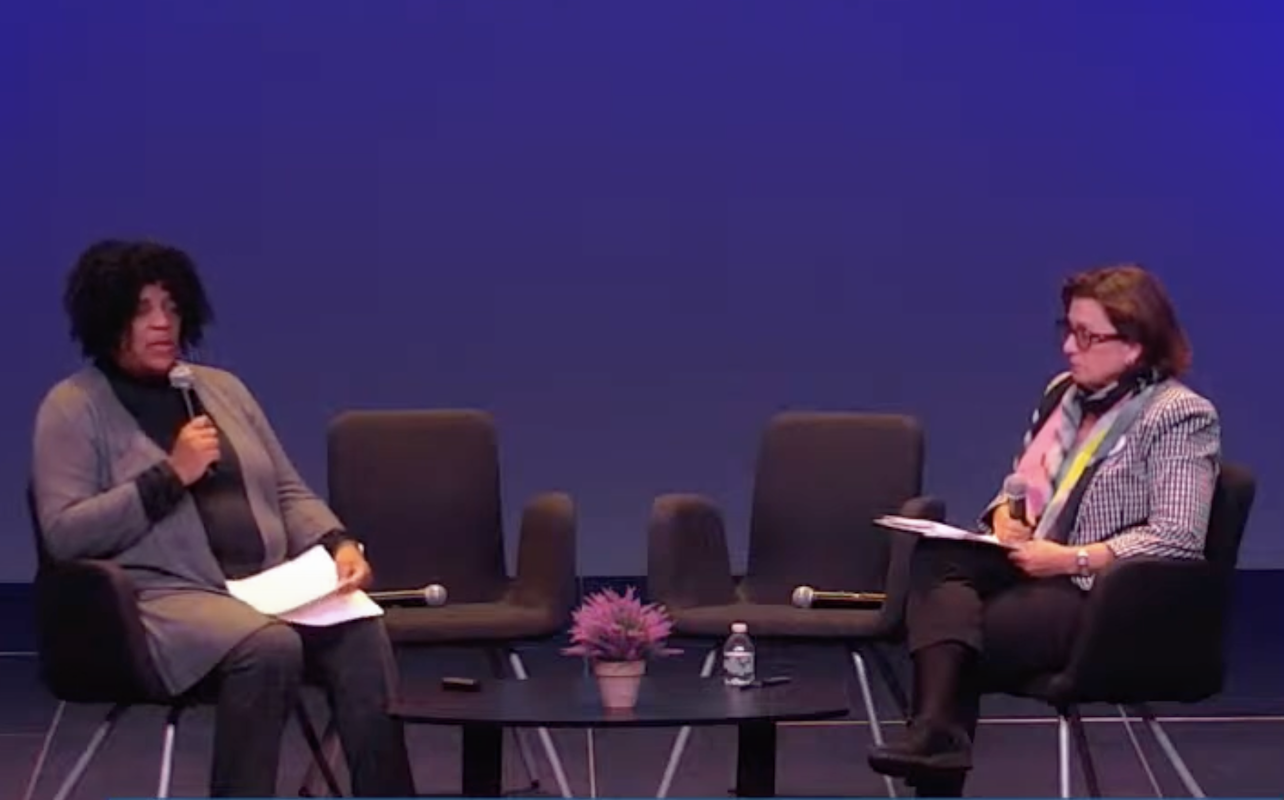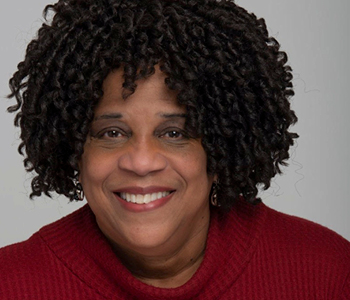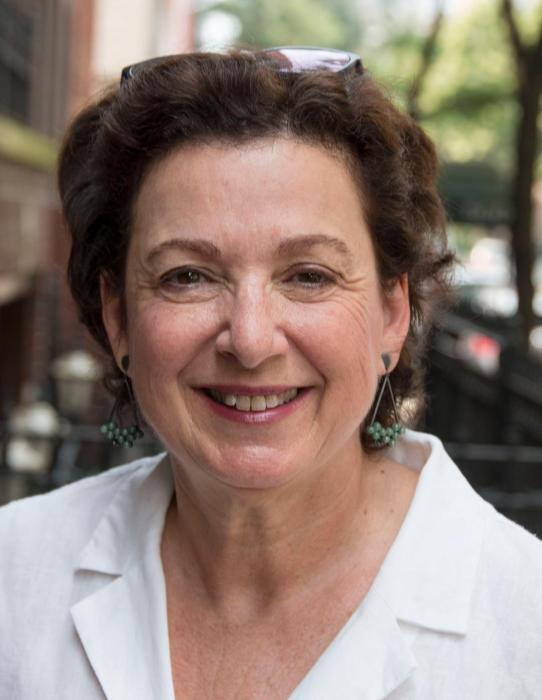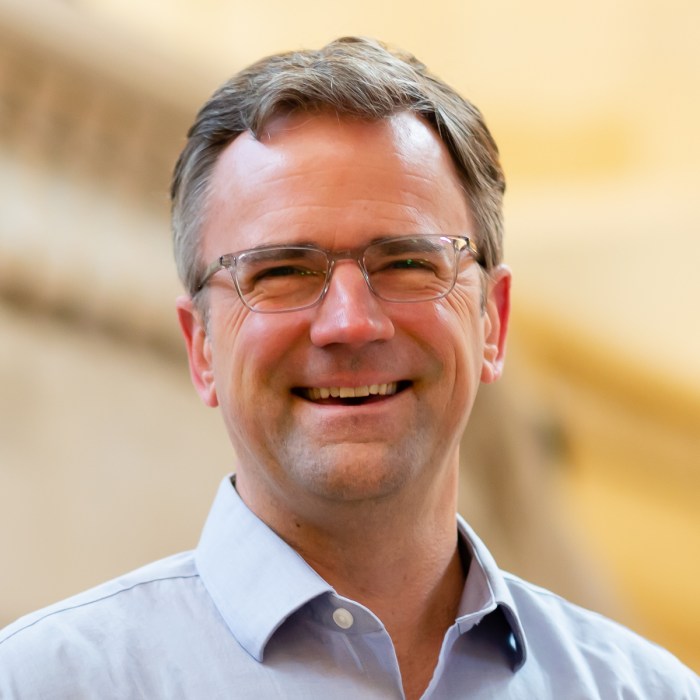League of Women Voters, Baruch College Professors Convene Forum on Election Misinformation

“In 2024, millions of people every day are yelling ‘fire’ on crowded social media platforms,” warned Don Waisanen, a professor in the Baruch College/CUNY Marxe School of Public & International Affairs. “And the scale and speed of misinformation online has increased exponentially.”
Waisanen was speaking at a Sept. 24 forum at LTV Studios in Wainscott titled “How to Confront Misinformation and Build Trust in the 2024 Election.”
The event, hosted by the League of Women Voters (LWV) of the Hamptons, Shelter Island and the North Fork, was convened to “explore the role of a trustworthy news media in a democracy and how to identify and combat mis- and dis-information on the internet, digital platforms and via AI.”

The first part of the evening featured a three-person panel discussion organized and moderated by the LWV’s Government Committee Co-chair Andrea Gabor, the Bloomberg Professor of Business Journalism at Baruch College/CUNY. Gabor was joined on stage by Sonia Jarvis, a Distinguished Lecturer, also at Baruch’s Marxe School of Public & International Affairs. Professor Waisanen took part in the discussion remotely via Zoom.
“In the last 20 years, the U.S. has lost close to 3,000 local newspapers or about one-third of all independent news outlets,” Gabor pointed out. “The spread of news deserts has also fueled extremism and local divisions, fracturing local communities. Now, the World Wide Web allows both domestic actors and foreign powers to spread misinformation, fake news and propaganda. This is particularly troubling during an election year.”
Waisanen stressed the need to define the difference between misinformation and disinformation online. “Disinformation is an attempt to deceive others with information that isn’t true, he said. “Misinformation is putting that information forward or reporting it, not necessarily knowing that it’s deceptive.”

Disinformation may feel more insidious than misinformation because bad actors are knowingly putting flagrant falsehoods out into the world as part of an effort to deceive the voting public and bring about a certain result – in this case, the election of a preferred candidate. But both forms of what can be characterized as fake news – whether defined as disinformation or misinformation – are extremely damaging to a functioning democracy.
“We’re seeing county clerks and secretaries of state overwhelmed with a tsunami of conspiracy theories, political pressure and personal threats,” Gabor said. She then posed a question which is extremely difficult to answer with any degree of certainty.
“How bad is disinformation in this election cycle. And how badly has it damaged trust in our elections?”
As part of his answer, Waisanen referenced a statement released by the World Economic Forum (WEF) earlier this year that characterized the issue in dire terms.
In a summary of its Global Risks Report 2024, the WEF ranked AI-derived misinformation and disinformation — and its implications for societal polarization — first among all global threats in its ranking of top 10 risks over the next two years, ahead of climate change, war and economic weakness.
While fully acknowledging the gravity of the threat posed by election misinformation, Waisanen took pains to point out that his research indicates that there is a legitimate silver lining as it relates to Americans’ perceptions of our electoral process. The professor noted that in a recent study he and a colleague conducted between May and September of this year, overall trust in our election system came in “higher than we expected.”

“There are a lot of media narratives out there – stories that I think maybe overstate the distrust people have in election systems,” he said.
Waisanen presented a brief summary of his findings on a numerical scale, noting that “most people have pretty good trust in our election systems in the United States and have pretty good confidence that election administrations run well, and that the people who run them have integrity and are doing the right things.”
The level of mistrust in our election system is difficult to quantify. But as Jarvis noted, “It’s important to acknowledge that the trust element is under attack. If we start there, then we can start thinking about how do we push back as a nation – not just individually – to say, ‘Hey, we had a pretty good system. It was working. Why isn’t it working now?’ And how can we do better for this election?’”
While disinformation reaches the American voting public in various ways – including through traditional media sources like television, radio and print publications – it’s easy to argue that social media plays an outsized role as an amplifier of innuendo, half-truths and outright lies.
Gabor pointed out that while there are many high-quality news sites on the internet which for the most part adhere to an accepted set of journalistic standards, many of them are hidden behind a paywall and therefore only accessible for a fee. And for every quality news site, there are countless sites spewing content she refers to as “toxic sludge,” a term Gabor borrowed from an honors course she co-taught with Waisanen at Baruch called “The News Media, Toxic Sludge and the Future of Democracy.”
“How worried should we be about political candidates or foreign governments weaponizing our personal social media data?” Gabor asked.
“I think we should be very concerned and I think it’s going to increase over the course of this election and beyond,” Jarvis responded. “The reason I’m pessimistic about this is that we can go back and look at the Telecommunications Act of 1996, which could have prevented some of this just by requiring certain regulations to be put into place at that time. But instead, the decision was made to exempt social media from those restrictions. And because of that lack of guidance or coverage or regulations, we’ve seen what has happened to the internet since that time.”
Jarvis made clear that she wasn’t advocating a radical approach to the policing of the internet, but rather that the voting public – and the world at large – would likely benefit from a higher degree of online regulation.
“I’m not suggesting we automatically shut down every social media site,” she said. “Instead, we can look at those places that are giving nothing but disinformation and say ‘you are going to be held to a higher standard than you have been up to this point.’ That’s a starting point but it’s not the ending point.”








